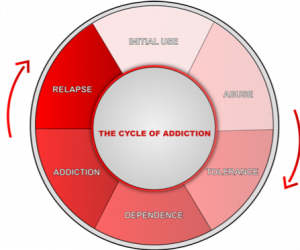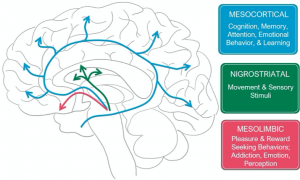Addiction has ravaged the population for countless years. Currently, there are nearly 21 million Americans with at least one addiction, yet only 10% receive treatment. Along with that, drug overdoses have tripled since 1990. If those statistics on how it’s affecting individuals aren’t enough, addiction costs the US government more than $600 billion every year. It is obvious that something must be done—we need to “convict” addiction.
The “what”
To figuratively put addiction behind bars, we first need to understand what it is. In the most general terms, addiction is “a chronic dysfunction of the brain system that involves reward, motivation, and memory.” After repeated use/exposure, the body can begin to crave the addictive substance or behavior, eventually reaching the point where all self-control is gone. Addicted individuals often show a lack of concern over consequences, though those consequences may be quite harmful to their mind, body, and spirit.
Addiction is a chronic dysfunction of the brain system that involves reward, motivation, and memory.
Addiction typically manifests as a cycle where the addicted individuals proceed th rough various “stages” as they continue to abuse the substance or behavior to which they have become addicted. The cycle also helps explain why most people don’t have a few drinks at a social event and wake up the next day as an alcoholic—addiction is a long, strenuous process where several circumstances have to line up in order for that person to become addicted. The cycle can be extremely challenging to escape, which accounts for the disheartened attitude seen so often in addicts seeking treatment. While the cycle may be seen as unescapable, even the most severe cases of addiction are treatable. Getting professional help is the way out and the way to a higher quality of life unaffected by the addictive substance or behavior.
rough various “stages” as they continue to abuse the substance or behavior to which they have become addicted. The cycle also helps explain why most people don’t have a few drinks at a social event and wake up the next day as an alcoholic—addiction is a long, strenuous process where several circumstances have to line up in order for that person to become addicted. The cycle can be extremely challenging to escape, which accounts for the disheartened attitude seen so often in addicts seeking treatment. While the cycle may be seen as unescapable, even the most severe cases of addiction are treatable. Getting professional help is the way out and the way to a higher quality of life unaffected by the addictive substance or behavior.
The “how”
Surely there must be some explanation as to why so many people battle with addiction. And that there is! As mentioned previously, one of the main reasons individuals become addicted is because of the reward associated with that substance or behavior. In the brain, dopamine is the main neurotransmitter associated with reward because it is connected to the reward centers of the brain involved in the mesolimbic pathway.  The mesolimbic pathway (pink/red in the figure) is a dopaminergic pathway that connects the ventral tegmental area (VTA) of the midbrain to the ventral striatum of the basal ganglia, which contains areas like the nucleus accumbens that are important in the “how” of addiction.
The mesolimbic pathway (pink/red in the figure) is a dopaminergic pathway that connects the ventral tegmental area (VTA) of the midbrain to the ventral striatum of the basal ganglia, which contains areas like the nucleus accumbens that are important in the “how” of addiction.
In order to get the reward, it all starts in the VTA. The VTA is activated when performing a pleasurable action (gambling, for example). Activation causes VTA neurons to release dopamine to neurons found in the nucleus accumbens. Dopamine release will cause the pleasurable effect that can ultimately result in addiction. What’s interesting is that after repeated use, the brain can actually “learn” in response. This results in what’s called long-term potentiation, a persistent strengthening of synapses based on recent activity. In the case of addiction, the synapses that are being strengthened are those associated with the mesolimbic pathway. These synaptic changes can result in the vulnerability seen in addicts that creates the compulsive drug-seeking behavior and limits self-control. Ultimately, there are many neurochemical elements related to addiction that cause the cycle mentioned earlier. For more information, check out the article linked at this website.
The “why”
We’ve already seen two important facets defending addiction’s conviction: the “what” and the “how.” But why should you care? Addiction may be nearing your doorstep sooner than you think. Phone addiction has been shown to demonstrate important behavioral similarities to compulsive gambling, the only behavioral addiction recognized in the DSM and known to have extremely addictive properties. With 81% of Americans now owning smartphones, the possibility of the younger generation become cell-phone and internet addicts is continually rising. It is important to keep these notions in mind while also realizing that our phones do serve important purposes in our lives. Just don’t let it control you! You may end up being the next big supporter of the conviction of addiction.
